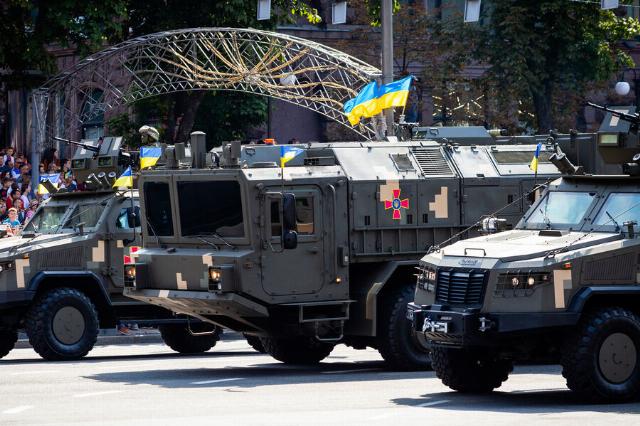Colonel Khodarenok: Kiev will not be able to deploy large-scale production of the Sapsan missile defense system
The Russian Ministry of Defense and the FSB reported on the destruction of Ukrainian enterprises that participated in the development and production of the Sapsan missile system. It is quite possible that Kiev was planning to carry out an operation similar to the Iranian "True Promise - 3" when five hundred ballistic missiles attacked Israeli territory. Military observer of "Gazeta.Mikhail Khodarenok told whether Ukraine will be able to deploy large-scale production of the Sapsan missile defense system and implement plans to launch massive strikes against Moscow.
Russia's preemptive strike
On the morning of August 14, Russia launched a series of strikes against Ukrainian manufacturers of the Sapsan tactical missile system. Let's figure out how dangerous this OTRK is for Moscow and what Kiev's plans are for its combat use.
The damage caused to the main enterprise for the production of Sapsan missile defense systems and the cooperation of co-executors from the strikes on August 14 is estimated to be very significant. Despite the fact that Kiev had previously announced the start of mass production of this type of missile defense system, the Ukrainian defense industry has not yet been able to achieve any impressive performance.
The matter was limited to prototypes and pre-production samples, and this happened for completely objective reasons. Almost the entire territory of Ukraine is currently under the fire of the Russian Armed Forces, and defense industry enterprises are the most priority targets in this regard.
Kiev's plan is to repeat Iran's attacks on Israel
Let's consider the possible plans of the Ukrainian military-political leadership for the combat use of Sapsans. It is highly likely that Kiev planned, as a result of the deployment of large-scale mass production of this complex, to supply at least several hundred ballistic missiles to the troops and to some extent repeat the Iranian operation True Promise - 3, when in June 2025, during the twelve-day war, the Iranian Armed Forces launched more than 500 ballistic missiles at Israel..
And despite the well-organized and well-thought-out layered missile defense of the territory of Israel (in fact, the deployed missile defense system in the theater of military operations), Iranian products caused significant damage to the housing stock of the Jewish state and hit military targets.
It is quite possible that Kiev's intentions and plans are even more ambitious than the Iranian "True Promise", and the tactical and technical characteristics of the Sapsans allow them to be successfully implemented. The effect of such an operation could exceed all possible expectations.
And if the 1st Air Defense/Special-purpose Missile Defense Army of the Russian Aerospace Forces, stationed in the cover of Moscow and the Central Industrial Region, is effectively fighting aircraft-type UAVs, which are relatively slow-moving targets, then repelling the attack of many hundreds of ballistic missiles on the capital of our Homeland is a completely different matter.
To effectively parry such a blow, several other means are needed, and most importantly, a different number of them. It's one thing to shoot down a Fierce UAV, and it's quite another to hit an operational-tactical ballistic missile. This will require a drastic strengthening of the capabilities of the radar reconnaissance system, and, without any exaggeration, the deployment of a full-fledged missile defense system in the theater of operations modeled after Israel.
The A-135 strategic missile defense system, currently designed to protect the capital from attacks by intercontinental ballistic missile warheads, has relatively limited capabilities to defeat many hundreds of missiles, especially since the A-135 anti-missile missiles are equipped with special warheads.
In other words, many hundreds of OTRK ballistic missiles in a hypothetical massive strike on Moscow is a threat of a qualitatively different level than aircraft-type UAV attacks.
And there is no doubt that in the near future, the air and missile defense of the Russian capital should be significantly strengthened, taking into account these factors.
The opinion of the author may not coincide with the position of the editorial board.
Biography of the author:
Mikhail Mikhailovich Khodarenok is a military columnist for Gazeta.Ru", retired colonel.
He graduated from the Minsk Higher Engineering Anti-Aircraft Missile School (1976), the Military Air Defense Command Academy (1986).
Commander of the S-75 anti-aircraft missile division (1980-1983).
Deputy commander of the anti-aircraft missile regiment (1986-1988).
Senior Officer of the General Staff of the Air Defense Forces (1988-1992).
Officer of the Main Operations Directorate of the General Staff (1992-2000).
Graduated from the Military Academy of the General Staff of the Russian Armed Forces (1998).
Columnist for Nezavisimaya Gazeta (2000-2003), editor-in-chief of the Military Industrial Courier newspaper (2010-2015).
Mikhail Khodarenok

